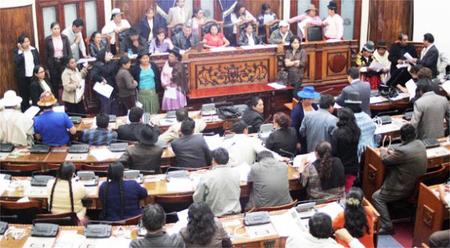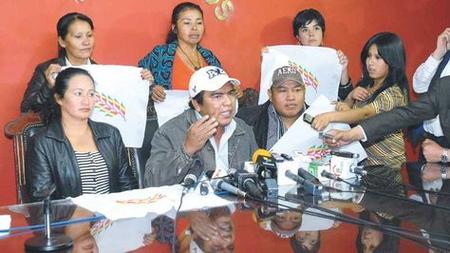
(above) "Indigenous bloc" challenges law in Plurinational Assembly. Photo: AFG/Agencia, LosTiempos.
Bolivian Congress Adopts Controversial TIPNIS Consultation Law
February 12, 2012 - NACLA (North American Congress on Latin America)
Late on the night of February 9, Bolivia’s Plurinational Assembly passed a new law mandating a consultation process for indigenous communities in the Isiboro-Sécure Indigenous Territory and National Park (TIPNIS), to redetermine the fate of a government-proposed highway that would bisect the reserve. Billed as a “compromise” between pro- and anti-road forces, the law has escalated the TIPNIS controversy and sparked new conflicts between lowland indigenous groups and among Bolivian social sectors on opposite sides of the issue.
The new law threatens to undermine the existing law that cancelled the highway and protects the TIPNIS as an “untouchable” ecological zone, promulgated by President Evo Morales just last October at the behest of TIPNIS marchers. The consultation law was developed by the Movement Towards Socialism (MAS) legislative leaders in conjunction with CONISUR, a dissident indigenous TIPNIS faction that sponsored a pro-road, government-supported counter-march in January.
The new law, which sailed through the MAS-controlled legislature in less than a week and is expected to be promulgated shortly by Morales, affirms the right of “free, prior, and informed” consultation for indigenous communities (Mojeño-Trinitario, Chimán, and Yuracaré) within the TIPNIS, based on the Bolivian Constitution and other international treaties to which Bolivia subscribes. The communities will be consulted on three issues: whether the TIPNIS should be declared “untouchable;” whether the proposed highway bisecting it should be constructed; and what measures should be established to protect the reserve against illegal settlements.
The process must be carried out “in good faith” by the government, in coordination with the indigenous communities and in their native languages, with full transparency, in a manner that guarantees informed participation. The consultation must be completed within 120 days. The agreements resulting from the consultation process are required to be implemented (by the government and the communities) on a mandatory basis.
While the law may provide a viable model for consultation with indigenous groups in other situations, in the TIPNIS context it has only served to ignite more controversy and confusion, for several reasons.
First, the TIPNIS consultation process will be anything but “prior,” since the construction contract and funding agreement for the road (with Brazil’s National Bank) have long been executed. The government has refused to cancel these contracts. Vice-President Alvaro García Linera now rationalizes--with some creativity, but dubious legal validity--that the ex-post facto consultation process will “right two wrongs:” the government’s failure to consult with TIPNIS groups prior to initiating the TIPNIS road, and also prior to cancelling it.
Second, the law leaves room for considerable ambiguity on the critical issue of who will be consulted. While the TIPNIS indigenous territory comprises some 63 Mojeño-Trinitario, Chimán, and Yuracaré communities, mostly affiliated with the TIPNIS Subcentral which has opposed the road, the TIPNIS national park also encompasses other members of the same indigenous groups who reside within the so-called “red line” (Polygon 7). Most of these communities affiliate with CONISUR, and support the road to further their economic interests (as farmers and coca-growers). Because these groups are not part of the collective land title, they arguably lack consultation rights under the Bolivian constitution--although any effort to exclude them, given their key role in promoting the consultation law, will be vigorously resisted.
Third, critics view the apparently binding nature of the consultation as a tacit abrogation of the law protecting the TIPNIS, at least in the event of a pro-road result. A binding consultation is also contrary to Bolivia’s electoral law. Morales has frequently stated that the government will not be bound by the results of any community consultation process, which he has characterized as “blackmail.” After the Assembly vote, key MAS legislators offered the contorted view that since only the agreements reached with the consulted TIPNIS communities--and not the consultation results themselves--will be binding, the government retains the ultimate right to choose its course of action.
Finally, critics say that the TIPNIS consultation process can’t be carried out in “good faith,” since the government responsible for implementing it is an interested party, strongly advocating for the road. And both the content of the law and the design of the consultation process are being carried out with CONISUR, a pro-road organization that does not legitimately or legally represent the TIPNIS indigenous territory. MAS dissident (and ex-Cochabamba governor) Rafael Puente accuses the government of carrying out a deliberate “disinformation strategy” by promoting CONISUR members as the “true representatives” of the TIPNIS, thereby allowing communities outside the indigenous territory to decide the fate of its inhabitants.
(below) CIDOB presentation at OAS-ICHR. Credit: La Razón.

CIDOB presentation at OAS-ICHR. Credit: La Razón.CIDOB, the lowlands indigenous federation that co-sponsored last summer’s march against the highway, has launched a new multi-pronged strategy in defense of the TIPNIS. In addition to denouncing the Morales government before international human rights commissions, they have called for a new national march in conjunction with allied sectors, as a broad defense of indigenous, environmental, and human rights. Morales has criticized the planned mobilization as a “march against the right to consultation” that disrespects the Constitution--a charge that may be difficult to overcome. However, key popular sectors including the highlands federation CONAMAQ and, potentially, the Bolivian Workers Central (COB), have indicated their support.
CIDOB and the TIPNIS Subcentral are also mobilizing to educate the TIPNIS communities about the highway, the existing law protecting the reserve, and the new consultation process. It’s unclear whether they will boycott the consultation or call for a “No” vote on the road, thereby legitimizing the process through their participation--a difficult decision that could critically affect the outcome.
There are also contingency plans for civil disobedience to prevent any effort to start construction on the TIPNIS road. Says Pedro Nuni, leader of the new “indigenous bloc” in the Assembly who led an unsuccessful attempt to block passage of the consultation law, “If necessary, we’ll offer our lives for the TIPNIS.”
Referencing these heightened tensions, human rights ombudsman Rolando Villena has called on Morales to withhold promulgation of the consultation law, to avoid the risk of unleashing violent confrontations and create space for dialogue. Barring that heroic but unlikely step, the next chapter of the TIPNIS conflict is likely to be more contentious than ever.
Update: the law was promulgated by Morales on the evening of February 10.